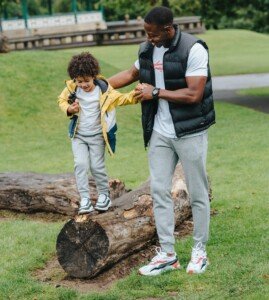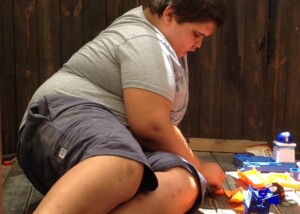Your preschool boy isn’t talking yet; a relative asks if he’s been checked for autism. You say “Yes, he doesn’t have autism.” But COULD he?
There is no definitive biomarker for autism spectrum disorder. No blood test. No saliva test. No urine test. No tissue sample to view under a microscope.
Whether or not a very young child gets an autism diagnosis is predicated on the skill of the assessor.
Unfortunately, the “assessment” in some cases is done by someone who’s not trained to probe for autism that presents less severely, such as a preschool teacher or “the school psychologist.”
What about pediatricians? Many can spot autism. “However, it is more difficult for pediatricians to identify autism in milder cases,” says Dr. Meghan T. Lee, clinical neuropsychologist and practice owner, Horizon Neuropsychological Services in Colorado.
Some parents will settle for an examiner who’s not specifically trained to evaluate for autism in the preschool child, figuring that the child is too young to need a “fancy assessment” from a doctorate in psychology or neuropsychology.
HOWEVER … this then begs the question: Can the doctorate in psychology or neuropsychology actually miss autism in that preschool boy with a speech delay?
“Yes, I have often seen autism being ‘missed’ in preschoolers,” says Dr. Lee.
This may more likely occur with old-school examiners who still subscribe to stereotypical presentations of autism in very young boys.
In fact, it’s not impossible for an examiner to rule out autism based on eye contact alone: “Your child isn’t autistic; he gave me good eye contact throughout.”
Here’s another pseudo-disqualifier for the diagnosis: “He plays with other children.”
Dr. Lee explains, “Many times, kiddos in that age range with a mild form of autism are able to interact with other children.
“What many parents, teachers and providers miss is whether there are stipulations to the interactions.”
What seems like normal social interaction — playing with the other kids — is, in fact, conditional – and this can be easily overlooked.
“For example, a child can interact with others as long as others initiate the interaction,” says Dr. Lee.
“Other times, a child can interact with others as long as others play what he/she wants to play.”
This can actually be mistaken for budding leadership skills! Or, it can pass as bossiness that the child picked up from older siblings!
“I have also seen children who can fluidly interact with other children but tend to ‘police’ their peers to ensure that they are following the rules.”
Do you see how this can mimic the desired traits of being a leader or obedient?
But it actually could be driven by autism spectrum disorder, since autistic people, including young kids, often have a heightened sense of justice (e.g., follow the rules!).
“ADHD is another big one,” says Dr. Lee. “If a child is hyperactive, teachers and providers are very quick to diagnose ADHD and completely overlook other symptoms.
“Similarly, if there is a language delay or disorder, many teachers and providers falsely assume that all social challenges are secondary to communication barriers.”
In other words, the parent believes the child will start initiating social interaction once they begin talking.
The parent comes home from the ASD assessment for their preschool child, satisfied with the “He doesn’t have autism” conclusion.
The parent may concur with the “He doesn’t have autism” verdict because the child doesn’t like being left alone and always wants to be at Mommy’s side or with other family members.
This kind of thinking harkens back to old stereotypes of the autistic little boy sitting alone on the floor spinning a plate for hours while family members are in the next room.
We need to abolish these stereotypes. A little Autist may be quite “needy” for his family members.
Missed Autism in a Preschool Boy OR Girl
If you have a lingering doubt about a negative diagnosis, ask yourself if your preschool child does any of the following:
- Bites his nails.
- Sucks his fingers.
- Walks on his tiptoes.
- Jumps repetitively.
- Bites or picks at his skin.
- Flaps his hands or arms when excited or stressed, or prolongs this for no apparent reason.
- Seems odd or strange at times – a peculiarity that cannot be explained away by a speech delay.
- Lines up his toys.
- Uses toys in ways they’re not intended.
Parents may already notice these behaviors and pass them off as normal responses to anxiety.
Walking on the toes may be seen as cute or adorable.
Jumping repetitively may be thought of as a precursor to athletic skills.
Lining up toys may be seen as orderliness. What parent doesn’t want their child to be tidy?
Bear in mind that the absence of these traits does NOT rule out autism! They’re just guidelines.
If you have a nagging feeling in your gut about the possibility of a missed autism diagnosis – it’s time for a second opinion – by a psychologist or neuropsychologist who has experience assessing very young children and doesn’t subscribe to stereotypes.
 Horizon Neuropsychological Services, LLC, owned by Dr. Meghan T. Lee, conducts neuropsychological evaluations for all ages. Our doctors evaluate for many conditions including autism spectrum disorder, ADHD, anxiety, depression, OCD, psychosis and behavioral difficulties. Our doctors show how patients can build upon their strengths and work around their weaknesses to be the best version of themselves.
Horizon Neuropsychological Services, LLC, owned by Dr. Meghan T. Lee, conducts neuropsychological evaluations for all ages. Our doctors evaluate for many conditions including autism spectrum disorder, ADHD, anxiety, depression, OCD, psychosis and behavioral difficulties. Our doctors show how patients can build upon their strengths and work around their weaknesses to be the best version of themselves.
 Lorra Garrick has been covering medical and fitness topics for many years, having written thousands of articles for print magazines and websites, including as a ghostwriter. She’s also a former ACE-certified personal trainer. In 2022 she received a diagnosis of Level 1 Autism Spectrum Disorder.
Lorra Garrick has been covering medical and fitness topics for many years, having written thousands of articles for print magazines and websites, including as a ghostwriter. She’s also a former ACE-certified personal trainer. In 2022 she received a diagnosis of Level 1 Autism Spectrum Disorder.
.
Top image: Pexels/anete-lusina
Autistic Special Interest vs. Neurotypical Hobby: the Difference?










































